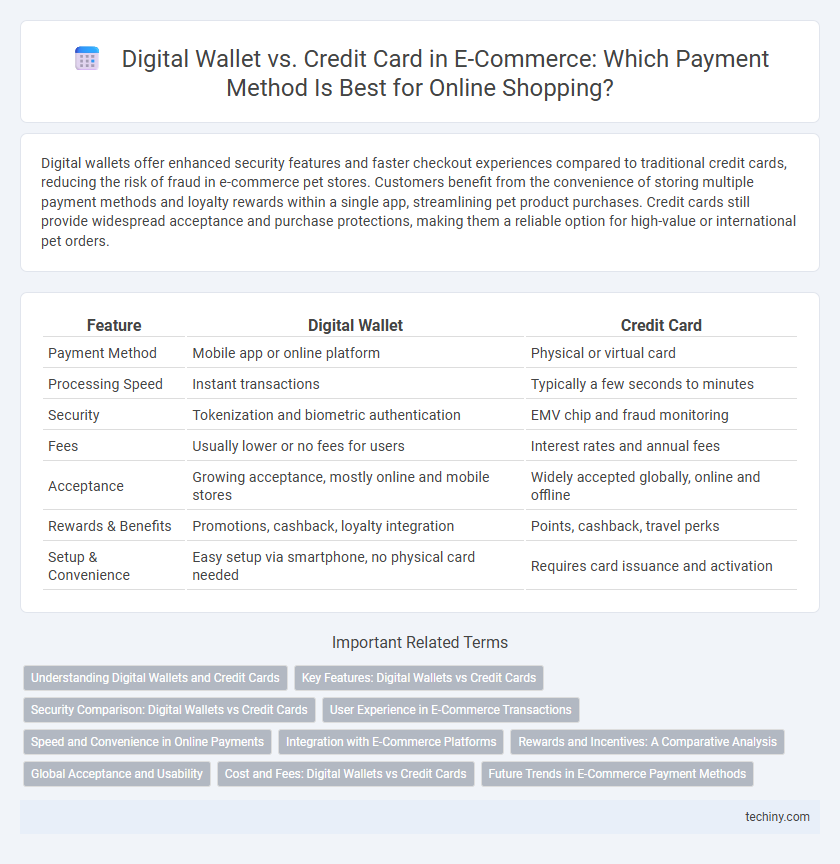Digital wallets offer enhanced security features and faster checkout experiences compared to traditional credit cards, reducing the risk of fraud in e-commerce pet stores. Customers benefit from the convenience of storing multiple payment methods and loyalty rewards within a single app, streamlining pet product purchases. Credit cards still provide widespread acceptance and purchase protections, making them a reliable option for high-value or international pet orders.
Table of Comparison
| Feature | Digital Wallet | Credit Card |
|---|---|---|
| Payment Method | Mobile app or online platform | Physical or virtual card |
| Processing Speed | Instant transactions | Typically a few seconds to minutes |
| Security | Tokenization and biometric authentication | EMV chip and fraud monitoring |
| Fees | Usually lower or no fees for users | Interest rates and annual fees |
| Acceptance | Growing acceptance, mostly online and mobile stores | Widely accepted globally, online and offline |
| Rewards & Benefits | Promotions, cashback, loyalty integration | Points, cashback, travel perks |
| Setup & Convenience | Easy setup via smartphone, no physical card needed | Requires card issuance and activation |
Understanding Digital Wallets and Credit Cards
Digital wallets securely store payment information, enabling fast, contactless transactions through smartphones or wearable devices, while credit cards rely on physical cards with embedded chips or magnetic strips for payment processing. Digital wallets often support multiple card types, loyalty programs, and biometric authentication, enhancing convenience and security compared to traditional credit card usage. Understanding these differences is crucial for e-commerce businesses to optimize payment options and improve customer experience.
Key Features: Digital Wallets vs Credit Cards
Digital wallets provide faster, contactless payments by securely storing multiple payment methods and personal information on a mobile device, enhancing convenience and security through encryption and biometric authentication. Credit cards offer widespread acceptance, built-in fraud protection, and credit-based purchasing power, but may involve physical card use and potential interest charges. The choice depends on factors like transaction speed, security features, user experience, and acceptance across merchants in the e-commerce ecosystem.
Security Comparison: Digital Wallets vs Credit Cards
Digital wallets utilize tokenization and biometric authentication to enhance transaction security, reducing the risk of fraud compared to traditional credit cards that rely on static card numbers. Credit cards are more vulnerable to skimming and physical theft, while digital wallets encrypt payment data and often require multi-factor authentication. The dynamic security features of digital wallets provide superior protection against unauthorized access and data breaches in e-commerce transactions.
User Experience in E-Commerce Transactions
Digital wallets streamline e-commerce transactions by offering faster checkout processes and enhanced security features such as tokenization and biometric authentication, significantly improving user experience. Credit cards, while widely accepted, often require manual input of card details and are more susceptible to fraud, potentially causing friction during payment. Integrating digital wallets reduces cart abandonment rates by providing seamless, one-click payment options favored by mobile shoppers.
Speed and Convenience in Online Payments
Digital wallets accelerate online payments by enabling instant transactions through saved payment information, bypassing the need to enter card details repeatedly. Credit cards require manual input of numbers and security codes, which can slow down the checkout process and increase the risk of errors. E-commerce platforms benefit from higher conversion rates when integrating digital wallets due to faster and more convenient payment experiences.
Integration with E-Commerce Platforms
Digital wallets offer seamless integration with e-commerce platforms through APIs and dedicated SDKs, enabling faster checkout processes and enhanced security features like tokenization. Credit cards remain widely accepted but often require additional PCI compliance measures for secure data handling, potentially slowing down transaction speed. E-commerce merchants benefit from digital wallets by reducing cart abandonment rates and improving user experience through one-click payments and stored credentials.
Rewards and Incentives: A Comparative Analysis
Digital wallets often provide enhanced rewards and incentives such as cashback, loyalty points, and exclusive discounts tailored to user spending patterns through AI-driven personalization. Credit cards commonly offer structured reward programs including travel miles, cashback percentages, and sign-up bonuses that appeal to diverse consumer preferences. E-commerce platforms increasingly integrate digital wallets to facilitate seamless reward redemption, boosting customer retention and purchase frequency.
Global Acceptance and Usability
Digital wallets are rapidly gaining global acceptance due to their seamless integration with mobile devices and contactless payment systems, providing enhanced usability for cross-border transactions and currency conversions. Credit cards remain widely accepted worldwide, supported by established payment networks such as Visa, MasterCard, and American Express, offering broad usability in both online and offline retail environments. Consumers benefit from digital wallets' faster checkout processes, while credit cards provide extensive fraud protection and rewards programs, making both payment methods essential in global e-commerce.
Cost and Fees: Digital Wallets vs Credit Cards
Digital wallets often reduce transaction fees by eliminating interchange fees typically charged by credit card networks, resulting in lower costs for merchants. Credit cards may impose annual fees, interest rates, and foreign transaction fees that are mostly absent in digital wallet usage. Lower fees and faster settlements associated with digital wallets enhance overall cost efficiency for both consumers and merchants in e-commerce transactions.
Future Trends in E-Commerce Payment Methods
Digital wallets are rapidly eclipsing credit cards as the preferred payment method in e-commerce due to enhanced security features like biometric authentication and tokenization. Emerging trends include the integration of cryptocurrencies and instant payment solutions, driving faster and more seamless transactions globally. Predictive analytics and AI-powered fraud detection further boost the reliability of digital wallets, positioning them as the cornerstone of future e-commerce payment ecosystems.
Digital Wallet vs Credit Card Infographic

 techiny.com
techiny.com